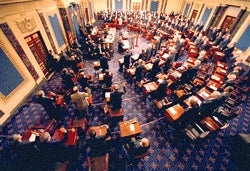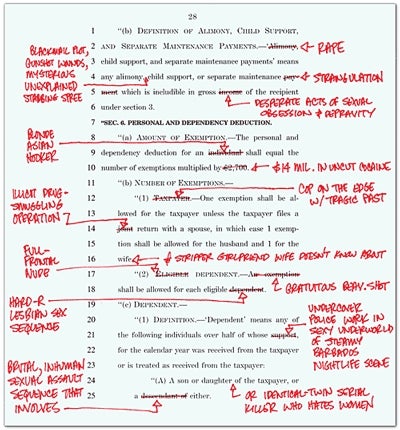WASHINGTON, DC–Concerned that the bill is too dry to connect with mainstream taxpayers, the U.S. Senate has brought in high-profile Hollywood screenwriter Joe Eszterhas to punch up Internal Revenue Code Amendment Act S. 1792.

“We’re extremely pleased to have Joe working on this project with us,” said Sen. Paul Wellstone (D-MN), addressing reporters at a press conference Monday. “As the man behind Basic Instinct and Flashdance, as well as countless other sexy box-office sizzlers, we felt he was the ideal guy to give this bill the jolt of electricity it needs.”
S. 1792, which would amend the Internal Revenue Code of 1986 to extend expiring provisions and fully allow nonrefundable personal credits against regular tax liability, has already been through six rewrites, worked over by such Washington heavy hitters as Sen. Fred Thompson (R-TN) and Sen. Joseph Biden (D-DE). But after the sixth rewrite tested poorly in subcommittee, the Senate decided to bring in an outsider.
“We originally envisioned S. 1792 as a small, independent bill,” said Wellstone, taking off his yellow-tinted, horn-rimmed glasses. “But after a couple of drafts, we realized that this thing had the potential to be something much bigger. We felt like somewhere in those 120 pages was a major hit just waiting to get out–if only we could find that perfect person to sculpt it and make it shine. That’s when my co-writer Barbara Boxer turned to me and said just one word: ’Eszterhas.’”
The bill was immediately sent to Eszterhas, who “really responded to the material.”
“I read the bill and thought, this is an amazing piece of work. But it lacks a third act and a compelling villain,” said Eszterhas from his Malibu beach house. “Still, I showed it to [director] Paul Verhoeven, and he flipped out. He said I’d be a schmuck if I didn’t do it.”

After a brief period of negotiations with the screenwriter’s agent over points and backend, Wellstone and Boxer got Eszterhas on board.
“We were clear that we wanted Joe to ’dial up’ the bill, make it bigger, funnier–really make it pop–but still preserve the soul and integrity of the original,” Boxer said.
The first rewrite was satisfactory for both sides, with Eszterhas adding sections that would provide tax breaks for Asian hookers, Colombian drug smugglers, and voyeurs with ties to the S&M underworld. With his next rewrite, Eszterhas continued to “add more heat to the bill,” shifting its focus from tax credits for working parents earning less than $20,000 annually to increased penalties for stalkers of cat-fighting exotic dancers. It was also during this rewrite that the bill’s name was changed to S. 1792: Maximum Liability.
“The buzz on this bill is incredible,” said James Swendeman, editor of CQ Weekly. “This is going to be the sleeper hit of the 107th Congress, and it hasn’t even been formally submitted yet. Representatives will be lining up around the block to vote for it. There hasn’t been anything like this since Reagan’s Star Wars defense proposal.”
The hype generated by S. 1792: Maximum Liability has many senators scrambling to inject some of its “over-the-top” feel into their own bill-writing.
“A lot of folks on Capitol Hill are going around saying, ’We need our own S. 1792, something sexy with major crossover appeal,” said Sen. Tom Harkin (D-IA). “For years, I’ve wanted to write a bill that would raise the minimum shower time for female prison inmates to 30 minutes, but I felt it would have been too exploitative. Now, I see that’s just what Congress wants.”

Some Beltway insiders remain cautious about the bill, noting that many previous attempts by Hollywood writers to punch up federal legislation have met with failure.
“When John Sayles worked on the bill for increased health benefits for Alaskan fishermen, it was a beautiful, poignant bill,” said Sen. Ernest Hollings (D-SC). “It only got 11 votes in the House, but those congressmen who supported it were deeply moved. Not at all like that $220 billion asteroid-defense-system bill Jerry Bruckheimer put out a few years ago. It was a soulless piece of crap, but everyone showed up for that vote.”
Despite the buzz S. 1792 is generating, some cracks have begun to show in the working relationship between Eszterhas and the Wellstone/Boxer team. In a Monday conference call, the two senators clashed sharply with Eszterhas over the screenwriter’s proposed changes to the story arc involving families with two or more dependents.
“We hope to keep the bill out of turnaround, but if pressured, we will put a pin in the project,” Boxer said. “According to the contract, we can keep asking for rewrites, but Eszterhas has the power of final draft. Still, if we don’t like what we see, we can always take our names off S. 1792 and replace them with the pseudonym Rep. Alan Smithee (I-CA).”
If the bill dies in the Senate, Eszterhas said he plans to shop it around Washington to find a new legislator to submit the bill.
“I see this bill as Showgirls meets HR 2859,” Eszterhas said. “I’m getting Sharon Stone, Michael Douglas, and Linda Fiorentino to help lobby for it. If Boxer and Wellstone don’t have the vision to see that this bill is going to be bigger than ’Don’t Ask, Don’t Tell,’ I’ll go over their heads.”
Eszterhas has also demanded an executive-producer credit on any sequel bills.







